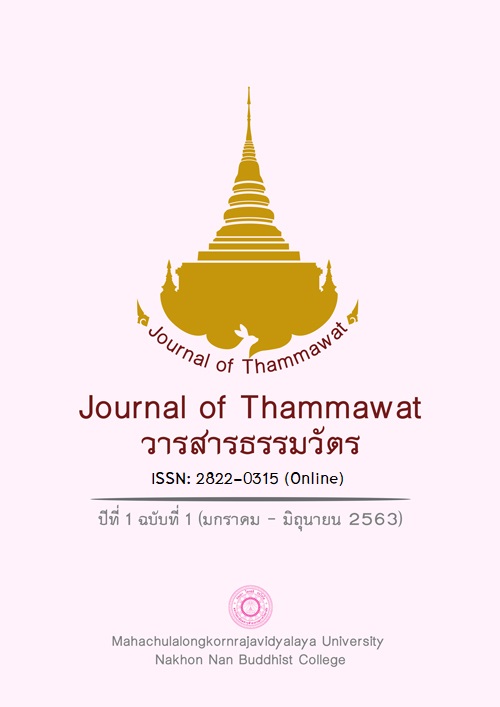An Approach in Buddhist Health Care for Diabetes at Thawangpha Hospital, Thawangpha District, Nan Province
Main Article Content
Abstract
Research on “an Approach in Buddhist Health Care for Diabetes at Thawangpha Hospital, Thawangpha District, Nan Province” aimed to 1) examine the Buddhist health care for diabetes, 2) examine the modern medicine health care for diabetes, and 3) present an approach in Buddhist health care for diabetes at Thawangpha hospital, Thawangpha district, Nan province.
The study found that diabetes is a Non-communicable Chronic Disease that cannot be completely cured but can be controlled and does not cause dangerous complications that are a burden to the family and community. Buddhist health care of diabetics is to apply the principles of Buddhism to the daily life of diabetics to be able to live a good life in term of physical, mental, social and intellectual health. Care to be provided to the diabetics is not only a medical treatment, but also a change in daily living habits i.e. food consumption behavior, exercise, the use of medications correctly according to the doctor's treatment plan, continuous access to the medical treatment plan, self-protection from complications, self-protection from stress, self-monitoring and evaluation of blood sugar levels. Buddhist principles that are suitable for caregivers (doctors, nurses) include 1) Sublime States of Mind, 2) The Noble Eightfold Path, 3) Bases of Sympathy, 4) Qualities of a Good Friend, 5 ) Professional ethics in medicine and nursing. Buddhism principles for diabetics include 1) Cultivation 4, 2) Meditation, 3) Threefold Training, 4) The Five Precepts, 5 ) Walking Meditation, 6 ) The Four Noble Truths, 7 ) Moderation in Eating, 8 ) Path of Accomplishment and 9) Bases of Sympathy. Applying Buddhism principles in daily life together with participatory management of partners, community networks, and families using the health literacy development process enables diabetics to be able to control blood sugar levels.
Article Details

This work is licensed under a Creative Commons Attribution-NonCommercial-NoDerivatives 4.0 International License.
References
กมลวรรณ หวังสุข และคณะ. (2554). การให้ความรู้เพื่อจัดการโรคเบาหวานด้วยตนเอง (พิมพ์ครั้งที่ 3). กรุงเทพมหานคร : บริษัทนิวธรรมดาการพิมพ์.
กรรณิการ์ ปัญญาวงศ์ และนายแพทย์พนัส พฤกษ์สนันท์. (2555). เอกสารประกอบการเรียน SE40001 วิชาการดูแลสุขภาพแบบองค์รวม Holistic Health Care. สมุทรสงคราม : สถาบันการเรียนรู้เพื่อปวงชน.
กองสุขศึกษา กรมสนับสนุนบริการ กระทรวงสาธารณสุข. (2558). การประเมินและ การสร้างเสริมความรอบรู้ด้านสุขภาพ (Health Literacy). กรุงเทพมหานคร : ม.ป.ท.
คมสันต์ ชื่นรัมย์. (2559). การพัฒนารูปแบบการดูแลสุขภาพตนเองในผู้ป่วยโรคเบาหวานชนิดไม่พึ่งอินซูลินของโรงพยาบาลสุศิริน ด้วยเทคนิคการวางแผนแบบมีส่วนร่วม (AIC). วารสารเครือข่ายวิทยาลัยพยาบาลและการสาธารณสุขภาคใต้, 3(3),179.
ธัญทิพย์ วิภาพงศ์ศานต์. (2553). ศึกษาการดูแลตนเองของผู้ป่วยเบาหวานตามแนวอริยสัจ4. (วิทยานิพนธ์พุทธศาสตรมหาบัณฑิต). มหาวิทยาลัยจุฬาลงกรณราชวิทยาลัย.
พระครูอินทสารวิจักษ์ อินฺทสโร (กิจโร่). (2551). ศึกษาการรักษาโรคด้วยยาสมุนไพรและธรรมโอสถที่ปรากฏในคัมภีร์พระพุทธศาสนา. (วิทยานิพนธ์พุทธศาสตรมหาบัณฑิต). มหาจุฬาลงกรณราชวิทยาลัย.
พระธรรมกิตติวงศ์ (ทองดีสุรเตโช). (2550). ศัพท์วิเคราะห์. (พิมพ์ครั้งที่ 2). กรุงเทพมหานคร : เลี่ยงเชียง.
พระธรรมปิฎก (ป.อ.ปยุตฺโต). (2543). พุทธธรรม. กรุงเทพมหานคร : มหาจุฬาลงกรณราชวิทยาลัย.
พระธรรมปิฎก. (2552). การแพทย์ยุคใหม่ในพุทธทัศน์. (พิมพ์ครั้งที่ 2). กรุงเทพมหานคร : บริษัท ธรรมสาร จำกัด.
พระธรรมปิฎก. (2543). พจนานุกรมพุทธศาสตร์ ฉบับประมวลศัพท์. กรุงเทพมหานคร : มหาจุฬาลงกรณราชวิทยาลัย.
พระปลัดสมชาย ปโยโค. (2556). พุทธบูรณาการการดูแลผู้ป่วยโรคเรื้อรังในสังคมไทย. วารสารสันติศึกษาปริทรรศน์ มจร, 3(2).
พระพรหมคุณาภรณ์ (ป.อ.ปยุตโต). (2551). สุขภาวะองค์รวมแนวพุทธ. (พิมพ์ครั้งที่ 6). กรุงเทพมหานคร : บริษัทสหพริ้นติ้งแอนด์พับลิสซิ่ง.
พระพุทธโฆสะเถระ สมเด็จพระพุฒาจารย์ (อาจ อาสภมหาเถร) แปลและเรียบเรียง. (2548). คัมภีร์วิสุทธิมรรค. (พิมพ์ครั้งที่ 6). กรุงเทพมหานคร : ธนาเพลส.
พระมหาบุญเพียร ปุญญวิริโย (แก้ววงศ์น้อย). (2544). แนวคิดและวิธีขัดเกลาทางสังคมในสถาบันครอบครัวแนวพระพุทธศาสนา. (วิทยานิพนธ์พุทธศาสตรมหาบัณฑิต). มหาวิทยาลัยมหาจุฬาลงกรณราชวิทยาลัย.
พระมหาอุเทน ปัญญาปริทัศน์. (2545). พระไตรปิฎกร่วมสมัย 1. (พิมพ์ครั้งที่ 2). กรุงเทพมหานคร : สำนักพิมพ์ธรรมดา.
พินิจ ลาภธนานนท์. (2556). ประเด็นสุขภาวะในพระไตรปิฎก. กรุงเทพมหานคร: บริษัท จรัลสนิทวงศ์การพิมพ์ จำกัด.
พุทธทาสภิกขุ. (2551). แก่นพุทธศาสน์. (พิมพ์ครั้งที่ 4). กรุงเทพมหานคร: สานักพิมพ์สุขภาพใจ.
มหาจุฬาลงกรณราชวิทยาลัย. (2539). พระไตรปิฎกภาษาไทย. ฉบับมหาจุฬาลงกรณราชวิทยาลัย. กรุงเทพมหานคร : มหาจุฬาลงกรณราชวิทยาลัย.
แม่ชีสุนันทา เชียงแหลม. (2555). พุทธปัญญา : วิธคิดแบบโยนิโสมนสิกาสู่การประยุกต์ใช้. วารสารบัณทิตศึกษาปริทรรศน์ มจร. 8 (ฉบับพิเศษเนื่องในโอกาสฉลองพุทธชยันตี 2600 ปี แห่งการตรัสรู้พระพุทธเจ้า), 618-630.
ราชบัณฑิตยสถาน. (2546). พจนานุกรมฉบับราชบัณฑิตยสถาน 2542. กรุงเทพมหานคร :นานมีบุคส์พับลิเคชั่นส์.
Kieffer, C. Citizen empowerment: a developmental perspective. In (eds.) J. Rappaport, C. Swift and R. Hess. (1984).Studies in empowerment: Steps toward understandingand action. Binghamton: The Haworth Press.
Rappaport, J. (1984 ). Studies in Empowerment: Introduction to the Issue. Prevention inHuman Services.


